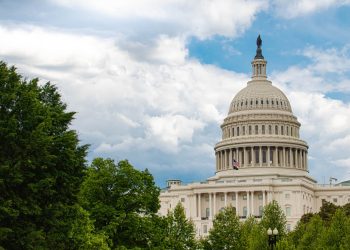In today’s polarizing environment, building bipartisan consensus on legislation isn’t easy. With one party in control of Washington, Democrats have spent most of the year focused on their reckless spending spree with little concern for Republican input or support. When Congress began negotiations on the annual defense bill—a bill that has passed with Republican and Democratic support every year for over 60 years—I knew it would require both parties to work in good faith on our most critical responsibility: equipping our military to meet, defeat, and continue to protect the homeland from external threats.
As a combat veteran, I worked hard to advance a bipartisan bill out of the Senate Armed Services Committee in July that included my work to provide troops the support, training, and equipment they need. And when the Senate Democratic Leader continued to delay the bill, I pushed for immediate action to protect our country against the growing national security concerns across the globe.
Last week, after far too long of a wait and a broken process, I was proud to support the final version of the annual defense bill, the Fiscal Year 2022 National Defense Authorization Act (NDAA). This bill includes many of my priorities for America’s national security interests, our servicemembers, and our veterans.
National Security
After the Biden administration’s disastrous exit from Afghanistan, I immediately sounded the alarm about the threats the withdrawal could pose for America’s homeland—and it’s now clear the withdrawal has made America less safe. That’s why I led an effort in the NDAA to direct the Secretary of Defense to report on the national security implications of the withdrawal. The bill also requires the Department of Defense (DoD) to develop a strategy to evacuate Special Immigrant Visa holders – men and women who have worked alongside U.S. personnel for the last two decades – who still remain in Afghanistan.
The counterterror fight is not the only threat America is still facing. We need to hold the Chinese Communist Party accountable for their lack of transparency and role in the outbreak of the COVID-19 pandemic. That’s why this defense bill requires the Pentagon and the Director of National Intelligence to assess the involvement of the Chinese Communist Party in the origins of COVID-19, and prohibits DoD from funding dangerous experiments by EcoHealth Alliance – the nonprofit that funneled U.S. tax dollars into the Wuhan Institute of Virology for dangerous coronavirus studies – in China.
Servicemembers
In the Army I learned, and still strongly believe in the ‘Mission First, People Always’ motto. That’s why I’ve consistently prioritized specific supports for our servicemembers in the annual defense bill.
This year, through my work, the bill fully funds procurements of protective body armor designed specifically for female troops across the total force, an effort I have long fought for. In addition, the NDAA creates a new category of leave for servicemembers dealing with the trauma of losing an immediate family member, defined as a spouse or child, for two weeks.
The bill also includes a number of critically important bipartisan efforts I worked on with Senators Kirsten Gillibrand and Chuck Grassley to prevent sexual assault in the military. While I was encouraged with the momentous reform we made to the way the military prevents these abuses and holds perpetrators accountable, there is still work to be done. That’s why Senators Gillibrand, Grassley, and I are calling for a Senate floor vote on the entirety of our bipartisan Military Justice Improvement and Increasing Prevention Act – a bill the Senate Armed Services Committee passed earlier this year and has the support of 65 senators.
Veterans
As a veteran who served overseas during Operation Iraqi Freedom, I’ve been working for years on a bipartisan effort to honor the veterans of the Global War on Terrorism. For all those who answered the call in the wake of 9/11 to keep America safe, we must never forget what they have done for our nation. Because of the support of so many, including more than 50 Democrats and Republicans in Congress, influential public figures, and the six surviving secretaries of Defense, this year’s NDAA includes my bill with Democratic Senator Maggie Hassan to build a memorial on the National Mall honoring the veterans of the Global War on Terrorism.
This year’s NDAA is proof that Congress can still work together on important legislation—something I wish we could see more often in Washington. As the top Republican on the Senate Armed Services Subcommittee on Emerging Threats and Capabilities, I will work with anyone to promote the safety and security of Iowans, and all Americans, and ensure our warfighters are equipped for the challenges we face today and in the future.
















